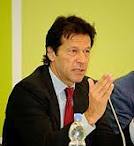Imran Khan must not offload the entire blame of Shia genocide on foreign conspiracies – by Zeeshan Haider
 Speaking at a recent television talk show, PTI chief Imran Khan tried to draw parallels between sectarian killings of Shia Muslims in Pakistan and conflicts in Iraq, Bahrain and Syria, saying he was convinced that the sectarianism in these Muslim countries was part of an international conspiracy to pit Sunnis and Shias against each other.
Speaking at a recent television talk show, PTI chief Imran Khan tried to draw parallels between sectarian killings of Shia Muslims in Pakistan and conflicts in Iraq, Bahrain and Syria, saying he was convinced that the sectarianism in these Muslim countries was part of an international conspiracy to pit Sunnis and Shias against each other.
However, the PTI chairman did not give any evidence to back up this claim. People of this country have long heard of a ‘foreign hand’ working to destabilise this country by fanning sectarian and ethnic violence but that hand has never been exposed. It is time for us to face the reality and, instead of blaming others for our problems, admit that many of these problems stem from our own flawed policies.
Sectarian violence, which in the main involves target killing of Shiites, in Pakistan started much before it erupted in other Muslim countries. The sectarian strife in Iraq started with the downfall of Saddam Hussein and infiltration of al-Qaeda fighters into that country.
In Bahrain, the majority Shia population has long been struggling against the Khalifa dynasty, while in Syria numerous opposition groups have revolted against President Bashar al-Assad. With Iran and Saudi Arabia supporting rival sides in the Syrian conflict and al-Qaeda making inroads into Syria, there is now a growing fear of outbreak of an all-out civil war in the country on sectarian lines-as happened in Iraq.
But the sectarian violence in Pakistan has a totally different context. In Pakistan, it was the so-called Islamisation drive of military dictator General Zia-ul-Haq that gave birth to sectarianism in the country in the 1980s.
Successive governments did not dare to rein in these sectarian militant groups because of their close links with the security establishment, which nurtured these and other jihadi groups to fight in Kashmir and Afghanistan. A tug of war between Saudi Arabia and Iran for expanding their influence in the region also added fuel to the sectarian fire.
After joining the war on terror, General Musharraf banned some of these groups but there was never any follow-up action by his government to fully dismantle these groups. Many of these groups resurfaced with new names and continued to fearlessly propagate their agendas.
But the dangerous upsurge of sectarian violence in recent months warrants urgent and effective measures before it turns into a full-blown conflict like Iraq and Syria. Till now it has been more of a law and order problem than a sectarian issue since the members of the two Islamic sects largely live in peace with each other.
The recent Fair Trial Bill is a good step but instead of dealing with the issue through piecemeal legislation, the government should thoroughly review its anti-terrorism laws and plug in loopholes.
Nearly 5,000 people were reportedly killed in over 2,000 sectarian attacks in the country since 1989 but very few perpetrators were given an exemplary punishment to deter others from committing such crimes. Many suspected terrorists and criminals walk away free because of weak prosecution and lack of proper evidence. There are thousands of cases pending in the courts in which witnesses refuse to testify for fear of reprisal from terrorists.
Many political parties try to appease radical groups for short-term political gains, particularly during elections. They should commit themselves against forging any alliances or seeking any support from such groups.
Sectarianism cannot be brought fully under control unless the security situation in the tribal areas stabilises because some of the major sectarian groups like Lashkar-e-Jhangvi have signed up to al-Qaeda- and Taliban-inspired militancy and shifted their bases to these unruly regions.
The writer is a journalist based in Islamabad. Email: zeesh.haider 14@gmail.com
Source: Adapted and edited from The News, September 10, 2012
